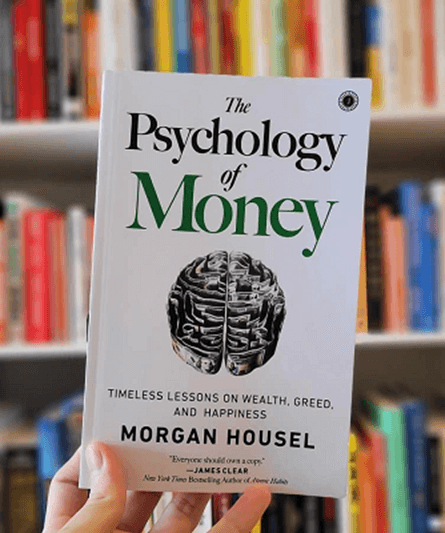The Psychology of Money SummaryAbout the AuthorFormer contributor to The Motley Fool and The Wall Street Journal, Morgan Housel is a partner at The Collaborative Fund. He has won the New York Times Sidney Award twice, placed in the finals for the Gerald Loeb Award for Distinguished Business and Financial Journalism twice, and won the Society of American Business Editors and Writers' Best in Business Award two times. Morgan has spoken at over 100 conferences in a dozen different countries. He discusses behavioral finance and history, using narrative to investigate how investors cope with risk and how we might think about risk more productively. Over three million copies of his book "The Psychology of Money" have been sold and translated into 53 other languages. He was ranked among the top 50 market influencers by MarketWatch in 2022. He is a member of the Markel board of directors. 
IntroductionThe Psychology of Money digs at the psychology of our financial shortcomings. Housel explores how previous experiences, shifting goals, and being coldly reasonable can all harm long-term financial advantages. The alternative is to set clear, acceptable financial objectives that rely only a little on past financial achievement. If you can implement these strategies, you will be financially successful in the long term. As a result, you will profit from the miracles of compound interest. Themes of the Book1. Everyone is Smart
2. Luck and Risk
3. A Moving Goal Post
4. Time is the Secret Sauce
SummaryThe Psychology of Money seeks to investigate the flaws in our mental attitudes toward money and the attitudes of successful individuals in general toward money. In other circumstances, the author puts forth his guidelines for thinking about and managing our money. Morgan Housel is a venture capitalist. He is well-known for his knowledge of financial history and behavioral finance. He has won several honors as a writer and journalist, and he has previously written a financial column for major newspapers such as The Motley Fool and The Wall Street Journal. There are 18 chapters in The Psychology of Money. These chapters serve as mini-lessons. There is no central plot in the work as a result. The book is structured around key ideas, such as long-term objectives, compound interest, and the value of chance and risk. First Lesson No one is crazy, according to the first lesson. The source of Housel's estimate is unknown, but he claims that although personal financial experiences only make up around 0.00000001% of all events in the world, they shape our perceptions of it to the extent of about 80%. According to Housel's view, our connection with money is shaped by our previous interactions. Everyone has had unique experiences. As a result, if you observe someone make a financial decision that you would not do, do not pass judgment on them. The individual's experiences have trained them to make that choice. However, Housel warns the reader not to base financial decisions only on personal experiences. Instead, Housel advises the reader to base financial decisions on goals and objectives. Second Lesson The second lesson focuses on chance and risk. According to Housel, things outside your control will significantly impact your investments more than anything you can do to affect them. He uses the instance of Bill Gates as an illustration. Like Malcolm Gladwell in Outliers, Bill Gates is particularly clever and works extremely hard. He did, however, have the good fortune to attend one of the few schools in the world that had a computer at the time, which provided him with an edge in the competition. There was some luck involved since, without it, there would be no Microsoft and no Bill Gates, the world's richest man. Housel suggests that, rather than attempting to recreate a Bill Gates-like fairy tale, we should focus on what generally works for many individuals. Third Lesson Lesson three is all about knowing when you have had enough. Housel describes how wealthy people are more likely to engage in extravagant spending. The belief is that when people get wealthy, their goals will shift. They desire more and more and do so in a way that compromises what they have worked for. Housel believes that it is critical for you to recognize when you have had enough and to begin playing it safe. The lesson here is to avoid sacrificing what you have and need to obtain something you want but do not require. Fourth Lesson Lesson four is likely the most highlighted in the book. It all comes down to compounding and compound interest. According to Housel, the mind needs help understanding the force of compounding. Housel's advice is that patience is the key to excellent investment. You don't require high rates of return on your investment. A consistent long-term performance would be advantageous. This is the path to financial success. Housel uses Warren Buffett as an example. Despite being nearly 90 years old, Buffett has over $80 billion net worth. But he started investing when he was ten, and more than half of his wealth developed after he turned 50. Housel is confident that compounding may help people achieve financial independence. Fifth Lesson According to lesson five, being an intelligent investor only includes making excellent judgments sometimes. Instead, it is about being consistent about not making mistakes and is related to compound interest. Housel thinks that not making mistakes helps you stay in the financial game for extended periods, giving your assets time to compound. Housel proposes that instead of focusing on ample profits, the reader should focus on having their finances in order so they cannot be broken. Sixth Lesson Lesson six connects to Lesson 2 and offers a similar message. Housel claims that you might be wrong 50% of the time and succeed financially. Housel believes that the super-rich is a one-in-a-million narrative, like what he said about Bill Gates. We need to remember this as a culture because we concentrate so much on the extremely wealthy. We look up to and respect them, yet it would be practically impossible to repeat what they have accomplished. A clear investor gets the fundamentals correct rather than attempting to imitate Jeff Bezos, Reed Hastings, or Elon Musk. Rather than trying to duplicate a miracle, they follow the average trends by making intelligent, rational judgments that help them attain their own realistic goals. Seventh Lesson Lesson seven is about perspective. According to Housel, the best dividend money can give is the ability to regulate your own time - your freedom. Eighth Lesson Lessons eight and nine also deal with perspective. The man in the automobile dilemma is covered in Lesson 8. You do not want to be friends with someone who is driving a Ferrari; you want to be that person. Numerous people gain wealth under the false impression that doing so will make others like them, but the truth is that it will only increase others' desire to resemble them, which is different. Ninth Lesson The ninth lesson covers how to spend money on essential things. Wealth, in Housel's opinion, is what you cannot see. It is not just flashy watches or fancy automobiles. Housel encourages the reader not to estimate a person's wealth based on what they see and own. According to Housel, genuine wealth is the ability to buy more things than you can right now. 
Tenth Lesson Lesson ten indicates that one of the best ways to save money is to remove your ego from the equation. Save money on necessary purchases to keep up with the wants. He proposes the following formula: Savings = Income - Ego. Housel returns to the subject of flexible thinking. The ability to work fewer hours or for a lower income for an occupation you are more interested in, or to invest in an opportunity you would not have been able to do otherwise, may be made possible by having more significant savings and lower expenses as a result of eliminating the ego from your spending. Eleventh Lesson The emphasis in lesson 11 is on the need to be reasonable rather than always sensible. Diets are no different. The best strategy is one you can follow through with. Being coldly logical is only sometimes straightforward, and we frequently need to pay more attention to the social aspects of investment. Pick a strategy that you can stick to instead. Twelfth Lesson According to Lesson 12, things that have never happened before happen all the time. Cultural trends will leave you behind if you continuously look to the past to determine future investments. Thirteenth Lesson In lesson 13, Housel emphasizes the need to give oneself extra time to recover from mistakes or unexpected occurrences. If you expect things to go differently than planned and give yourself some flexible space, you will be reassured if things go wrong for a short period. Fourteenth Lesson According to Lesson 14, you will change over time. So set reasonable objectives because you will not necessarily desire the same things in 5 or 10 years. Fifteenth Lesson According to lesson 15, Everything has a price, and just because you cannot see it doesn't mean you won't have to pay for it. The stock market fluctuates. You will occasionally lose money. If you can frame these drops as expenses for playing the game rather than losses, you can stay the course. According to Housel, the best way to make huge amounts of money over a long period is to stick with it. Sixteenth Lesson Being careful about whom you seek financial advice from is covered in lesson 16. Applying advice from someone who has different financial circumstances or goals than you is difficult. In the long run, it will not work. Instead, consider the bigger picture and follow what helps people in your situation. Seventeenth Lesson Being positive is lesson number 17. You will benefit long-term from it. You must be patient since, in general, things will get back on track and start to flourish again. Eighteenth Lesson Lesson 18 explains why requiring a story is more effective than data. Getting caught up in a beautiful narrative is easy, but be cautious since some stories are too good to be true. Housel mentions World War I as an example. It was the conflict that put a stop to all wars. Nobody wanted to witness such suffering again. The fact, though, was that another battle was just around the bend. Housel cautions you not to fool yourself. Overall, the book focuses on doing the basics correctly, avoiding stupid things, and staying in it for a long time. AnalysisMany individuals recall the first time they saw a compound interest table or heard about how starting to save in their 20s will improve their lives. It amazed them since the outcomes needed to be more intuitively correct. Linear reasoning is far more intuitive than exponential reasoning. When compounding is not apparent, we overlook its potential and focus on other ways to solve issues. We hardly think about the compounding potential, not because we are overthinking. The practical message is that the contradictions of compounding are to blame for the bulk of failed trades, terrible strategies, and successful investment initiatives. A good investment is only sometimes about getting the best returns because the highest returns are usually one-time events that cannot be replicated. It is about producing decent profits you can stick with and repeat for as long as possible. That is when compounding takes over. Sources of Information
Next TopicThe Rime of the Ancient Mariner Summary
|
 For Videos Join Our Youtube Channel: Join Now
For Videos Join Our Youtube Channel: Join Now
Feedback
- Send your Feedback to [email protected]
Help Others, Please Share









